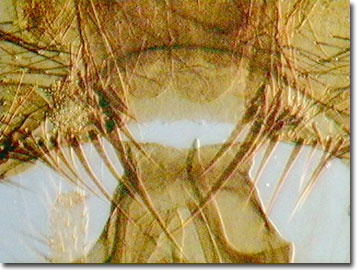Oblique Digital Image Gallery
House Fly Mouthparts
The often maligned common house fly is generally thought to be a nuisance and vector for many diseases that affect both humans and animals. Flies lay up to 1000 eggs in some of the most undesirable settings such as garbage, decomposing plant and animal matter, feces, spoiled food, and manure. Although more abundant in the warm spring and hot summer weather, house flies may exist year-round in temperate climates, where their life cycles occur every eight days.

House flies are among the speediest of insects with an average speed of about five miles per hour (mph) with bursts to 15 mph when threatened. The rapid beating of their wings (about 1,000 times per second) is responsible for the buzzing noise that accompanies a close fly-by. The sensitive antennae of the fly is responsible for detecting both food sources and changes in air currents which signal the approach of enemies.
The life-span of a typical fly is about 21 days, but they can live much longer in cool weather, although their metabolism and active movement is severely reduced. The average fly is between five to eight millimeters in length and they range from gray to dark brown with dark stripes on the thorax. The abdomen is colored yellow on the sides, and the eyes are often red or green. The mouth forms a fleshy proboscis, which is used to gather food. The larvae are cylindrical white maggots that average about a centimeter in length and taper off at the ends. Puparia are reddish-brown and are about half the size of the larvae.
Contributing Authors
Cynthia D. Kelly, Thomas J. Fellers and Michael W. Davidson - National High Magnetic Field Laboratory, 1800 East Paul Dirac Dr., The Florida State University, Tallahassee, Florida, 32310.
BACK TO THE OBLIQUE IMAGE GALLERY
BACK TO THE DIGITAL IMAGE GALLERIES
Questions or comments? Send us an email.
© 1995-2025 by Michael W. Davidson and The Florida State University. All Rights Reserved. No images, graphics, software, scripts, or applets may be reproduced or used in any manner without permission from the copyright holders. Use of this website means you agree to all of the Legal Terms and Conditions set forth by the owners.
This website is maintained by our
Graphics & Web Programming Team
in collaboration with Optical Microscopy at the
National High Magnetic Field Laboratory.
Last Modification Friday, Nov 13, 2015 at 01:19 PM
Access Count Since September 17, 2002: 12174
Visit the website of our partner in introductory microscopy education:
|
|
